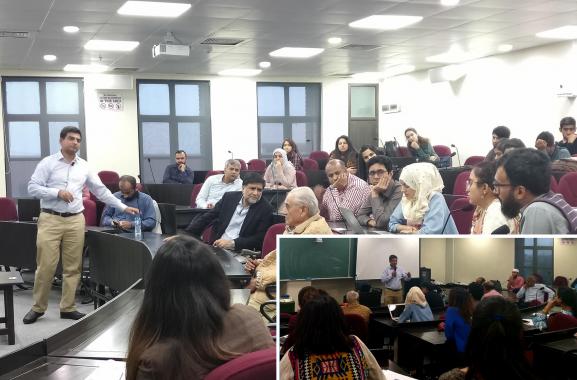
LUMS Syed Ahsan Ali and Syed Maratib Ali School of Education (SOE) organised an EduSpeak 2018 Session on November 16, 2018 with Dr. Sabieh Anwar, Associate Professor, Department of Physics, Syed Babar Ali School of Science and Engineering (SBASSE).
Dr. Sabieh Anwar completed his DPhil from the Department of Physics, Oxford University in 2004, where he studied as a Rhodes Scholar from Pakistan. Dr. Anwar is also the Joint Secretary and one of the founders of the Khwarizmi Science Society, a non-profit organisation aiming at developing a science culture in Lahore’s educational institutions. He is also a recipient of ICTP Physics Prize for the year 2008 as well as Aizaz-e-Sabqat from the Government of Pakistan.
The event was attended by Founder and Pro Chancellor LUMS, Syed Babar Ali, Dr. Tahir Andrabi, Dean, SOE, Dr. Mariam Chughtai, Professor and Associate Dean, SOE, LUMS faculty, and students. Dr. Tayyaba Tamim, Associate Professor, SOE moderated the event.
The session revolved around an experiment of liquid nitrogen, which was performed to demonstrate the need for classroom experiments. Through the session and the experiment, Dr. Anwar emphasised upon the importance of analytical skills gained through experiments along with text book theoretical knowledge. He mentioned how the sole focus on theoretical concepts in the Pakistani curriculum does not leave room for any creativity, and that for concepts to be communicated in an engaging manner, they need to tell a story which can only happen through class room experimentation.
He stressed the importance of outreach programmes, open houses for laboratory experimentations, and workshops for teacher trainings, as the only way forward is a keen interest shown by the teacher community. He also suggested better incentives for the teachers.
Syed Babar Ali added that a missionary spirit is also important in the teachers which should be inculcated through trainings. Dr. Tahir Andrabi said that practical application Is indeed an important aspect, which needed to be mainstreamed not just in science but also in education overall.
The Q&A session comprised of insightful exchanges among the students, faculty and the speaker. Many different topics were discussed ranging from the importance of NGOs contribution in scientific development, government facilitation to the scientific arena, to challenges in teachers training.








